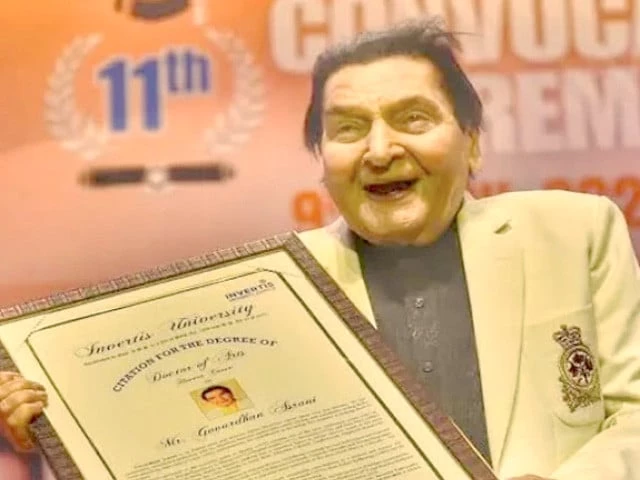Asrani, Bollywood's gentle jester takes his final bow
Comic icon redefined humour with humanity and heart

Govardhan Asrani, fondly known simply as Asrani, who brought joy and satire to Indian cinema for over six decades, passed away in Mumbai on Monday, at the age of 84, after a prolonged illness.
His death marked the end of an era in Hindi cinema, one defined by wit, warmth and the effortless brilliance of a man who could make audiences laugh with just a glance.
Born in Jaipur on 1 January 1941, Asrani grew up in a modest Sindhi household where humour, not fame, was his natural inheritance. After completing his education, he joined All India Radio as a voice artist to fund his studies before heading to Pune to train at the Film Institute.
His passion for acting led him to Mumbai in the early 1960s, and by 1967 he had secured his first break in 'Hare Kaanch Ki Choodiyan'. What followed was one of the most prolific and versatile careers in Indian cinema.
Asrani appeared in more than 350 films across Hindi and Gujarati cinema, excelling in comic, character, and even villainous roles. From the late 1960s to the 1980s, he became the face of cinematic comedy, often playing the affable friend or bumbling clerk who stole scenes with impeccable timing and humanity.
His collaborations with directors like Hrishikesh Mukherjee, Basu Chatterjee and BR Chopra, and his close friendship with superstar Rajesh Khanna - with whom he worked in 25 films - cemented his place among Bollywood's most dependable talents.
Yet, for all his memorable roles, it was his portrayal of the eccentric jailer in 'Sholay' (1975) that turned him into an immortal icon. With the unforgettable line, "Hum angrezon ke zamaane ke jailer hain," Asrani became a part of India's cinematic folklore.
Decades later, he would fondly recall how people still asked him to recite the dialogue at every public event, calling it a tribute to director Ramesh Sippy and writers Salim-Javed, who gave him "a role for the ages."
Beyond 'Sholay', Asrani's comic magic lit up classics like 'Chupke Chupke', 'Bawarchi', 'Aaj Ki Taaza Khabar', 'Rafoo Chakkar', 'Balika Badhu', and 'Namak Haraam'. His ability to blend slapstick with intelligence and charm made him a favourite among filmmakers and audiences alike. He twice won the Filmfare Award for Best Comedian, but his true legacy lay in the joy he inspired across generations.
In the 1990s and 2000s, he adapted seamlessly to a new era of comedy, featuring in hit films such as 'Hera Pheri', 'Dhamaal', 'Bhool Bhulaiyaa', and 'De Dana Dan'. Younger actors and comedians revered him as a mentor who carried old-school discipline with a light heart.
Actor Akshay Kumar, mourning his death, wrote: "What an absolute loss to our industry. God bless you, Asrani Sir, for giving us a million reasons to laugh."
Asrani is survived by his wife, actress Manju Bansal, and close family members. His last rites were performed at Santacruz Crematorium, attended by family, friends, and admirers from across the film fraternity.
From his crooked moustache in 'Sholay' to his glinting eyes behind thick spectacles, Asrani's face became shorthand for laughter itself. He was not just a comedian - he was cinema's heartbeat, an artist who turned ordinary words into everlasting joy.



















COMMENTS
Comments are moderated and generally will be posted if they are on-topic and not abusive.
For more information, please see our Comments FAQ